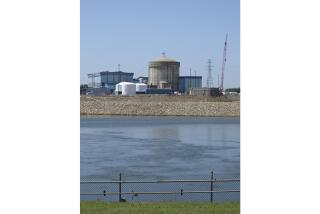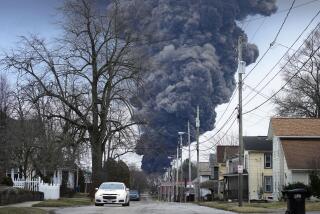Union Carbide’s Decision to Forgo Safety Measure Questioned by House Panel
- Share via
WASHINGTON — In a widening probe of the chemical industry’s safety practices, House investigators are questioning a little-noticed decision by Union Carbide Corp. to forgo a costly safety measure at a West Virginia factory that makes methyl isocyanate, the toxic gas involved in the disaster at Bhopal, India.
The measure, one of several proposed last July by Carbide’s own safety experts, was aimed at reducing “a real potential” that water might leak into the factory’s methyl isocyanate tanks, sparking a chemical reaction that would spew deadly gas throughout the area.
Carbide officials rejected the proposal last October, saying they “cannot justify the expense.” Two months later, a similar water leak caused storage tanks at the Bhopal factory to rupture, releasing a gas cloud that killed more than 2,000 persons.
April Target Date
Union Carbide’s top safety official told a congressional subcommittee Tuesday that the Institute, W.Va., plant is safe and that production of methyl isocyanate, suspended shortly after the Bhopal accident, would probably resume in April.
But California Rep. Henry A. Waxman (D-Los Angeles), who heads the House Energy and Commerce subcommittee on health and the environment, is scrutinizing the October decision for evidence of corner-cutting by Carbide officials or the federal regulators who oversee the industry.
He is said to be especially displeased by an Occupational Safety and Health Administration report, released last week, that gave the Institute plant a clean bill of health on safety procedures. The report did not mention Carbide’s own concerns about the methyl isocyanate works.
Waxman asked OSHA last Friday to surrender any documents it has relating to the Carbide safety proposals.
‘Subject of Concern’
“It’s something we’d like to learn more about,” a Waxman aide said Wednesday. “Given that 2,000 people died in India from exactly this kind of problem--the mixing of water with methyl isocyanate--it’s a subject of concern.”
The rejected safety proposal, one of four suggested by Carbide experts after a July inspection of the Institute plant’s methyl isocyanate works, would have substituted chloroform for salt water in the system used to cool the plant’s methyl isocyanate tanks.
Carbide’s safety inspectors noted that the salt water solution “provides a source of water contamination and perhaps a potential reaction catalyst” should the brine leak into one of the tanks. Water reacts violently with methyl isocyanate, producing heat that causes the normally liquid chemical to expand and turn into a gas.
Union Carbide officials, in an Oct. 10 response to the internal safety inspection, said they had “considered a chloroform cooling system for the unit storage tanks, but we cannot justify the expense.” The response stated that other “administrative controls,” including more frequent checks for water leaks, would reduce the risk.
One Pint of Water
According to Indian government scientists, about one pint of water is believed to have caused a reaction at the Bhopal plant, rupturing the factory’s underground storage tanks and releasing a huge cloud of gas. The Bhopal leak did not originate in the plant’s cooling system, which uses Freon gas instead of salt water.
Despite the Bhopal accident, Union Carbide does not think the Institute cooling system needs to be changed, Jackson B. Browning, Carbide’s health, safety and environmental director, said in an interview Tuesday.
Salt water “is a perfectly acceptable cooling medium” for the methyl isocyanate tanks as long as it is frequently checked for leaks, he said. Institute officials have increased monitoring of the methyl isocyanate tanks and have instructed plant workers to be more vigilant in detecting leaks, Browning said.
Range of Issues
The Carbide inquiry heads a range of issues being probed by Waxman’s subcommittee in preparation for hearings on chemical-industry safety, probably in March or April.
House investigators have asked 87 major chemical companies to turn over internal safety analyses--similar to Carbide’s Institute survey.
Waxman also has asked the General Accounting Office to determine whether the Environmental Protection Agency is accurately monitoring toxic chemical spills and gas emissions from the nation’s 5,000-plus chemical plants.
More to Read
Inside the business of entertainment
The Wide Shot brings you news, analysis and insights on everything from streaming wars to production — and what it all means for the future.
You may occasionally receive promotional content from the Los Angeles Times.










